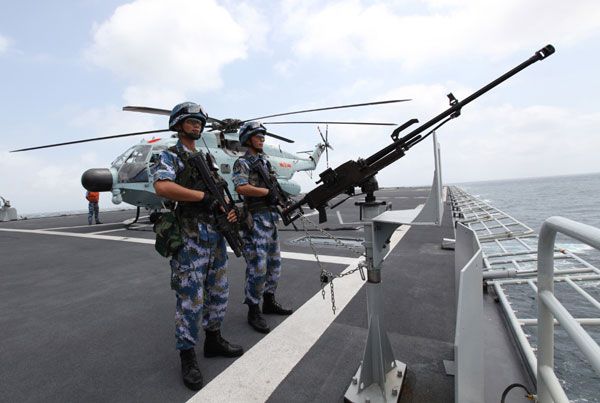Ongoing Yemen crisis draws international concern
(Xinhua) Updated: 2015-03-30 14:52
 |
|
Chinese Navy soldiers observe from China's amphibious landing ship Changbaishan during an escort mission in the Gulf of Aden, Aug 26, 2014. This is the 18th convoy fleet sent by the Chinese People's Liberation Army Navy for these missions since 2008. [Photo/Xinhua] |
Sounds of warplanes could be heard across the capital while the Houthi fighters repelled fighter jets by intensified anti-aircraft artillery.
The Houthi-controlled Interior Ministry said in a statement on Sunday that air raids overnight Saturday on military targets in Sanaa killed four soldiers and injured 33 others.
The intensifying crisis also aroused concern of the Arab League (AL) members, who have agreed to establish a joint Arab military force.
"In response to the responsibility imposed by the grave challenges facing our Arab nation and threatening its resources, the Arab leaders have decided to approve the principle of forming an Arab military force," Egyptian President Abdel-Fattah al-Sisi said in his closing speech of the 26th Arab Summit.
Sisi added that a high-level team is to be formed and supervised by the chiefs of staff of the participant states to study all necessary aspects for the establishment of the joint military force.
AL Secretary-General Nabil al-Araby said that the decision is "important and urgent" due to the ongoing unrest and threats facing the Arab world that require collective response.
Meanwhile, the AL members also called for immediate withdrawal of Houthi fighters from Sanaa that has been under their control since last September.
They also urged the Houthis to pull away from governmental institutions, and hand over their arms to legitimate authorities.
One of the reasons why Saudi Arabia and Arab countries spared no effort to hit the Houthis was to stop the rebels' rapid advance to the border and storm Saudi Arabia, and to blockade the strategic Bab al-Mandab Strait in the Red Sea, through which thousands of ships pass every year, analysts said.






